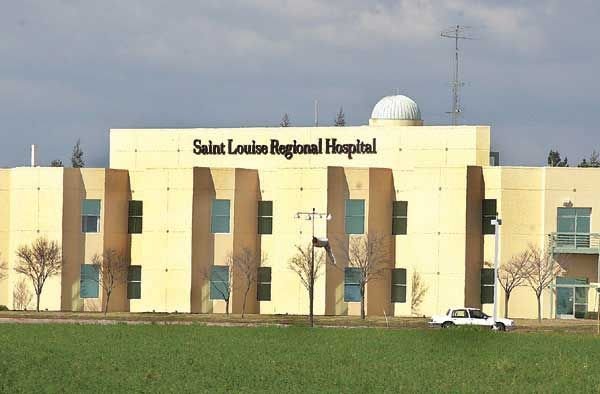Santa Clara County officials and a segment of Daughters of Charity Health System employees remain on edge over the pending sale of the nonprofit hospitals to Prime Healthcare.
Representatives of Prime Healthcare, a for-profit company, say the fears are unfounded, and the company has committed to keeping affordable healthcare accessible for local residents and honoring existing employment and retiree contracts.
DCHS announced Oct. 10 that it reached an agreement to sell its six-hospital system to Prime, nearly a year after DCHS put the nonprofit facilities up for sale. The DCHS system includes Saint Louise Hospital in Gilroy, which serves patients throughout South County and northern San Benito County.
The sale must be reviewed and ultimately approved by the California Attorney General’s Office, according to hospital officials.
Supervisor Mike Wasserman said shortly after the announcement of the sale to Prime, the board of supervisors met in closed session to discuss the transaction. While he said he couldn’t reveal the details of that discussion, Wasserman noted that the county—which put in an unsuccessful bid to purchase SLRH and O’Connor Hospital in San Jose—is worried about Prime’s for-profit motives.
“We as a county have been communicating our concerns to the attorney general,” Wasserman said. “The No. 1 thing is maintaining the healthcare services in Santa Clara County. You’ve got a for-profit organization—it’s not much of a reach to assume that they might take steps as far as profitability goes.”
Prime Healthcare spokesman Steve Getzug of Hill & Knowlton Strategies said the “deal terms” of the purchase of the hospitals will ensure healthcare remains at least as accessible as it currently is in communities served by DCHS.
Prime has pledged to keep all of the hospitals open for at least five years; maintain or increase DCHS’ current charitable care policies; spend more than $150 million over a three-year period on capital improvements and equipment purchases within the system; and maintain independent medical staff and a local governing board for each hospital, Getzug noted.
DCHS CEO Robert Issai added that breaking up the hospital system and selling the facilities “piecemeal”—as the county offered to buy SLRH and O’Connor—would have done more damage to the system as a whole and its existing employees.
“We were lucky to have Prime Healthcare’s offer for the entire system,” Issai said.
In an unrelated complaint, nurses and other healthcare workers at DCHS filed a class action lawsuit Oct. 21 against DCHS to protect the pensions of nearly 9,000 of the system’s employees and retirees. The employees are represented by the Service Employees International Union, and the suit alleges that DCHS has evaded federal pension law requirements, thereby underfunding the pension plan by about $229 million.
The lawsuit claims that DCHS has improperly classified the pension plan as a “church plan,” which is exempt from federal law governing pensions, according to a press release from SEIU-United Healthcare Workers West. However, the employees claim only actual churches—and not hospitals or healthcare facilities—can qualify for that exemption.
Furthermore, the employees say the sale of DCHS to Prime exacerbated their concerns because the buyer has “not committed to operate the plan as a (protected) plan, nor has it committed to address the plan’s enormous funding shortfall pursuant to the requirements” of federal law, according to the press release from SEIU-UHW.
The lawsuit is backed by SEIU-UHW which represents thousands of DCHS hospitals, and the United Nurses Associations of California which represents about 800 registered nurses at DCHS’ St. Francis Medical Center in Lynwood.
But Prime and DCHS say the buyer has committed to what the SEIU-UHW is seeking.
“Prime Healthcare, as part of its purchase agreement with Daughters, has agreed to assume hundreds of millions of dollars in pension guarantees for more than 17,000 union and non-union active and retired workers,” Getzug said. “Our willingness to accept 100 percent responsibility to protect the pensions was extremely important to DCHS, and, we’re told, was a differentiating point for us among other bidders for their system.”
About 7,600 people are employed in the DCHS system, and Prime has vowed to “substantially protect” those jobs and the annual $750 million payroll, Getzug added. The buyer has also pledged to assume nearly $300 million in pension liabilities for employees and retirees.
The timing of the lawsuit is “strange,” Issai responded, because it is apparent that the employees making the pension claims are not impressed with the buyer, “for whatever reason.”
“For them to bring a lawsuit, which is going to be years in the making, is going to cost a lot of legal fees for them and for us, and it just does not make sense,” Issai said. “I can only think they’re doing this because they’re trying to derail this transaction to Prime Healthcare, which I don’t understand.”
He added that while Prime has been accused of questionable practices in the past, “the Prime Healthcare of today is a different company.” That includes the fact that five of Prime’s 15 hospitals in California are “disproportionate share hospitals” which, as policy, treat all indigent patients regardless of their ability to pay for the care.















